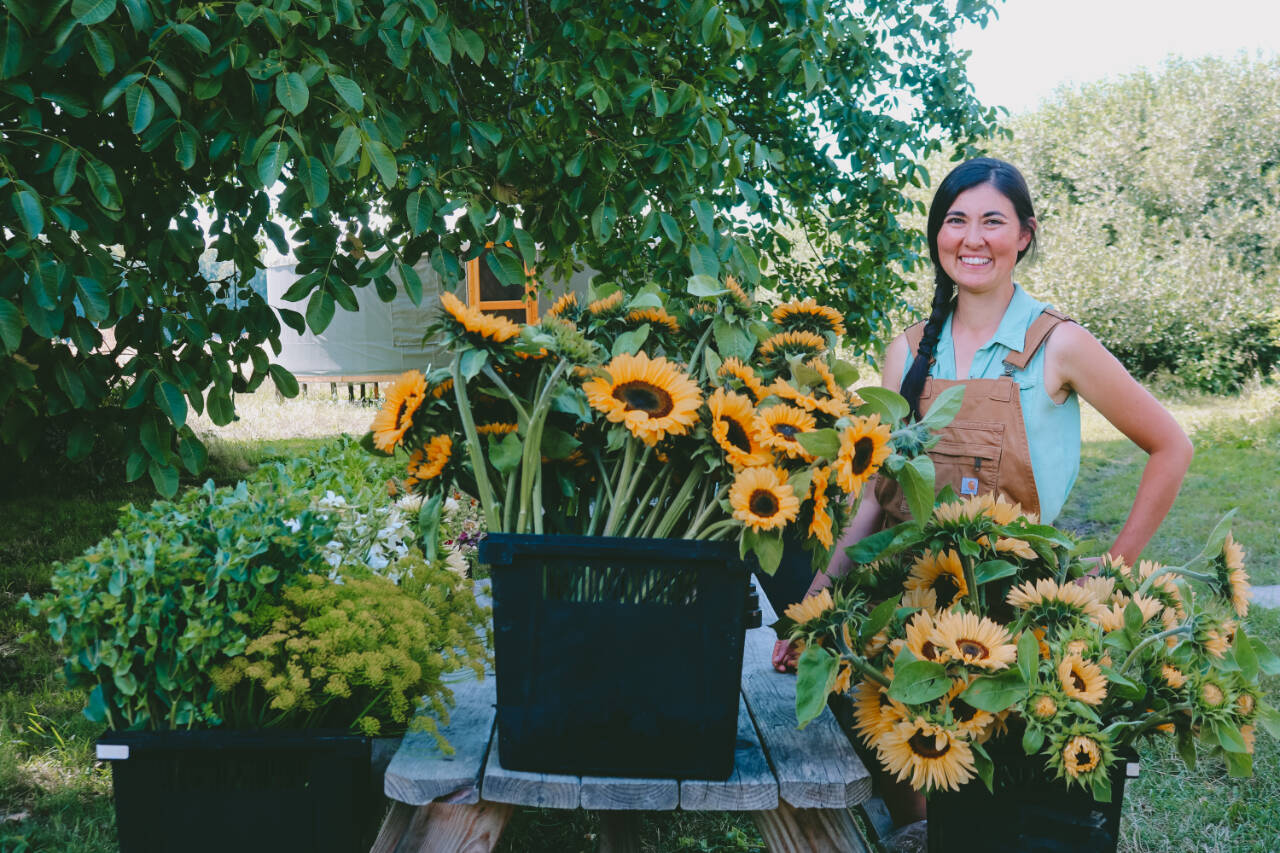Walk into the Sequim Farmers and Artisans Market on any Saturday this summer, and you may be surprised by the kaleidoscope of flower bouquets. Amidst the bins brimming with fresh produce, a handful of stalls stand out for their bright pops of colors.
Jembe Farms, Stone Tree Farm, Emily’s Flowers … each a canvas of floral artistry, with each farm offering its own unique take on flowers, providing different varieties and different artistic shapes.
Among these is Tampopo Farm, a 2-year-old, two-person farm known for both its bountiful produce and floral beauty.
When I drive up to Tampopo Farm for a visit, I notice the crates brimming with harvested flowers in preparation for Saturday’s Market. Sunflowers stretch towards the sky, yarrow flaunts its pastel allure, zinnias burst forth in vivid splendor, and amaranth adds a touch of warmth — all arranged upon a picnic table as if nature herself were preparing an exquisite feast.
Owned by wife and husband, Teresa Shiraishi and Matt Rohanna, Tampopo Farm is the result of their joint vision. Shiraishi, both a farmer and dedicated social worker, sows not only seeds but also cultivates a connection between the earth and community care.
“When I started gardening with flowers several years ago, there was an instant, innate love for it,” Shiraishi said. “Matt’s been farming for 10 years, and our dreams joined when I fell in love with flower farming.”
The cultivation of these blooms throughout the entirety of harvest season is no casual affair; it’s a harmonious choreography of planning and selection. Unlike their vegetable counterparts, flowers demand patience, their growth unfolding at a gentler pace.
The flowers Shiraishi arranges into bouquets were planted for four months, and she’s already begun planning for next year’s flower crop.
Shiraishi describes how sometimes the value of flowers is not always as obviously intrinsic as its produce counterparts. However, she noted, flowers have immense utilitarian value.
Flowers are vital to human food systems for their role in pollination. According to the USDA, it is the flower’s beauty and aestheticism — showy petals, different colors and shapes — that provide visual cues to attract pollinators.
Flowers can also serve cross purposes as herbs or edibles. For example, Tampopo Farm is named after the Japanese word for “dandelion” — a flower, despite its recent reputation as a weed, that has been used as a reliable and easy-to-grow food source for humans for thousands of years.
Besides the practicality and biodiversity of flowers, Shiraishi also speaks to the artistic value of flowers. Teresa has always loved artistic expression.
And there’s yet another layer: a connection to her work as a social worker, providing therapeutic services to clients recovering from PTSD and sexual trauma. She’s seen the role of nature and beauty in recovery and alleviating anxiety and stress.
“I don’t know that I work with a client where being outside in some way isn’t part of the coping toolbox,” Shiraishi said.
“My clients know that I’m a farmer and I bring that into my work in terms of what grounding and being outside can do for folks.”
In this intertwined journey of farming and healing, Tampopo Farm proudly participates in the food access programs at the Market, such as SNAP/EBT and Senior/WIC Farmers Market Nutrition Program. This commitment ensures that their products are accessible to individuals from all walks of life, irrespective of income levels.
Whether it’s tending the farm or tending to clients, Shiraishi expresses her gratitude for her ability to work in roles that align with her values and personal ethics.
Her story serves as a powerful reminder that a bouquet can be more than just a bunch of flowers: underneath is a whole narrative woven from soil, sweat, wisdom, the joy of creation and the power of healing.
Bailey Loveless is the market director of the Sequim Farmers & Artisans Market.
Sequim Farmers & Artisans Market
Open: 9 a.m.-2 p.m. Saturdays through Oct. 29
Location: Sequim Civic Center Plaza and Centennial Place, downtown Sequim
More info: director@sequimmarket.com, 360-582-6218
On the web: sequimmarket.com



